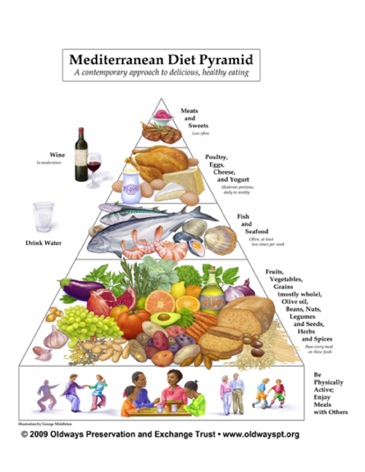|
The Mediterranean Diet Pyramid
The Mediterranean diet is not actually a diet as such, it's more of a lifestyle choice based upon the eating habits & styles of a region of Europe. A study has shown that amongst all Europeans, Mediterranean people live the longest!. Scientists believe that part of the reason for this is their dietery eating habits.
 Custom Search In the mid-1990’s, Dr. Walter Willett of the Harvard University School of Public Health presented the Mediterranean Diet as a modern Nutrition recommendation. This diet is inspired by the traditional dietary patterns of Mediterranean countries like Italy, Greece, Southern France and Spain.
The Mediterranean diet consists of the basic Foods components of healthy eating, with slight variations. Like most healthy diets, this one involves consumption of lots of fruits and vegetables. However, there is a slight variation in portion sizes when it comes to certain food types. The Mediterranean diet also lends itself perfectly to adaptation to both vegetarian & Vegan alternatives with the simple removal of the meat & fish with veggie alternatives!. The best way to illustrate the basics of the Mediterranean diet is through the use of a pyramid, whereby from the bottom to the top it gives a guide as to the daily-weekly-monthly regularity of different foodstuffs & exercise. As you will quickly recognise there are no Recipes ,merely an ingredients list for you to develop your own specific recipes from!
© 2009 Oldways Preservation & Exchange Trust
The guidelines for the Mediterranean Diet include the following: Olive oil plays a major part in all Mediterranean dishes and is used mostly to prepare salads, vegetable dishes, tomato sauces and for frying fish as well as a dressing for many dishes. This type of oil contains mono-unsaturated fat, which is the kind that helps reduces the levels of LDL cholesterol. When this oil is used in place of margarine, butter or other fats, it displaces saturated fat in one’s diet. The least processed forms of the oil like virgin or extra virgin olive oil contain the highest levels of antioxidant effects from protective plant compounds. Increasing your fruit and vegetable intake, especially tomatoes, lowers your risk of cancer and heart disease due to their high antioxidant content. Tomatoes, in particular, get increased levels of lycopene antioxidants when cooked or prepared as a sauce. Omega-3 polyunsaturated fats that are found in oily fish is beneficial to the heart because it promotes healthy blood circulation. Interestingly, wine also plays its part in this diet. Taken in moderation and usually during meals, wine is actually beneficial to the body. Red wine, in particular, contains many health-promoting plant compounds called phytochemicals. Men should drink two glasses of wine per day, while women should drink only one glass per day. It is believed that following the Mediterranean Diet will lower your risk of heart disease. A study in the United States in 2007 has shown that men and women who have followed this diet actually lowered their risk of death due to both cancer and heart disease. This diet also provides enough protection against Type 2 Diabetes, based on a 2008 published study in the British Medical Journal. Another great addition to the Mediterranean diet is the daily consumption of Green Tea which offers huge health benefits linked to it's high levels of health giving antioxidants!. If you have any great Mediterranean diet pyramid suggestions or tips of your own, or alternatively have any questions regarding the Mediterranean diet pyramid please Contact Us by simply clicking the link!. You might also enjoy these......Weight Loss & Diet Tips
|











